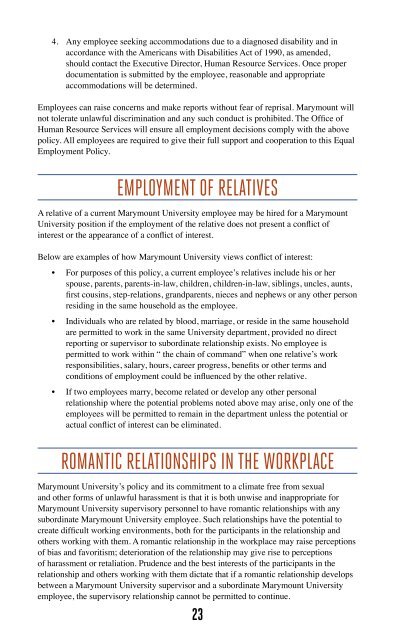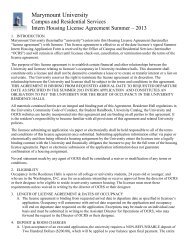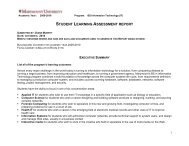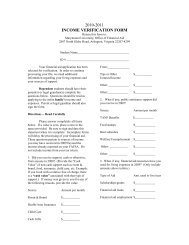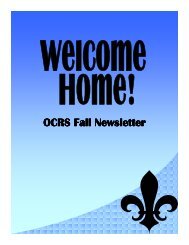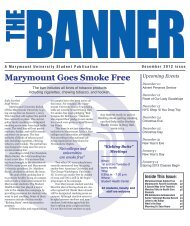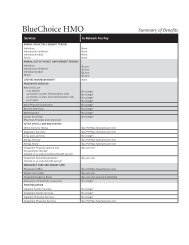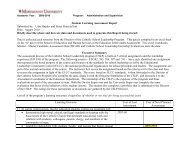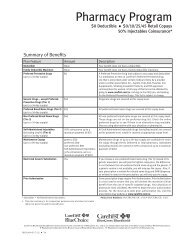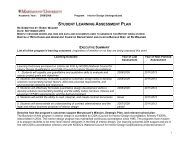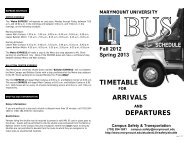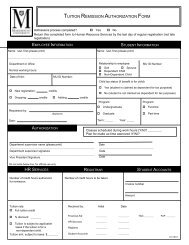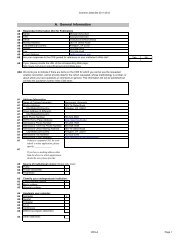EmployEE Handbook - Marymount University
EmployEE Handbook - Marymount University
EmployEE Handbook - Marymount University
You also want an ePaper? Increase the reach of your titles
YUMPU automatically turns print PDFs into web optimized ePapers that Google loves.
4. Any employee seeking accommodations due to a diagnosed disability and in<br />
accordance with the Americans with Disabilities Act of 1990, as amended,<br />
should contact the Executive Director, Human Resource Services. Once proper<br />
documentation is submitted by the employee, reasonable and appropriate<br />
accommodations will be determined.<br />
Employees can raise concerns and make reports without fear of reprisal. <strong>Marymount</strong> will<br />
not tolerate unlawful discrimination and any such conduct is prohibited. The Office of<br />
Human Resource Services will ensure all employment decisions comply with the above<br />
policy. All employees are required to give their full support and cooperation to this Equal<br />
Employment Policy.<br />
Employment of Relatives<br />
A relative of a current <strong>Marymount</strong> <strong>University</strong> employee may be hired for a <strong>Marymount</strong><br />
<strong>University</strong> position if the employment of the relative does not present a conflict of<br />
interest or the appearance of a conflict of interest.<br />
Below are examples of how <strong>Marymount</strong> <strong>University</strong> views conflict of interest:<br />
• For purposes of this policy, a current employee’s relatives include his or her<br />
spouse, parents, parents-in-law, children, children-in-law, siblings, uncles, aunts,<br />
first cousins, step-relations, grandparents, nieces and nephews or any other person<br />
residing in the same household as the employee.<br />
• Individuals who are related by blood, marriage, or reside in the same household<br />
are permitted to work in the same <strong>University</strong> department, provided no direct<br />
reporting or supervisor to subordinate relationship exists. No employee is<br />
permitted to work within “ the chain of command” when one relative’s work<br />
responsibilities, salary, hours, career progress, benefits or other terms and<br />
conditions of employment could be influenced by the other relative.<br />
• If two employees marry, become related or develop any other personal<br />
relationship where the potential problems noted above may arise, only one of the<br />
employees will be permitted to remain in the department unless the potential or<br />
actual conflict of interest can be eliminated.<br />
Romantic Relationships in the Workplace<br />
<strong>Marymount</strong> <strong>University</strong>’s policy and its commitment to a climate free from sexual<br />
and other forms of unlawful harassment is that it is both unwise and inappropriate for<br />
<strong>Marymount</strong> <strong>University</strong> supervisory personnel to have romantic relationships with any<br />
subordinate <strong>Marymount</strong> <strong>University</strong> employee. Such relationships have the potential to<br />
create difficult working environments, both for the participants in the relationship and<br />
others working with them. A romantic relationship in the workplace may raise perceptions<br />
of bias and favoritism; deterioration of the relationship may give rise to perceptions<br />
of harassment or retaliation. Prudence and the best interests of the participants in the<br />
relationship and others working with them dictate that if a romantic relationship develops<br />
between a <strong>Marymount</strong> <strong>University</strong> supervisor and a subordinate <strong>Marymount</strong> <strong>University</strong><br />
employee, the supervisory relationship cannot be permitted to continue.<br />
23


